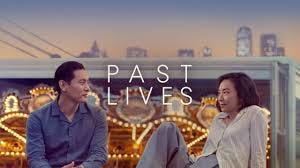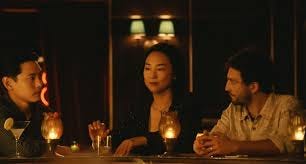Multiverse narratives and exploration of alternative realities and life paths seem to have captured the imagination of screenwriters over the last few years. As developments in physics and AI technology opens up a bewildering array of potentialities, our minds more frequently occupy spaces of abstraction, communicating across screens and pondering what lies beneath the veneer of our myriad individual realities. Past Lives is very much grounded in reality but still explores the idea that each choice we make in life shapes every moment that follows, whether it seems significant or trivial to us at the time.
The film charts the lives of two South Koreans, Na Young and Hae Sung, who were childhood friends but separated aged 12 when Na Young’s family moves to the United States. Technology brings them back together in the digital world 12 years later but life and circumstance intervene to prevent a reunion. Think of any significant relationship in your life. Could it have happened if circumstances were different, if you were a little older or younger, or a little less reckless? The amount of variables and elements that have to line up to facilitate that first meeting or first dalliance, or first look of interest, is infinitesimal. Our very existence and birth relies on such alignments.
Technology and social media has disrupted the natural order of things in this arena of life. If you yearn for a street you once lived on, you can use Google maps to take a virtual trip there. If you wonder about how an old friend is doing, you can check using Facebook or one of the other platforms of so called ‘connectivity.’ Na Young speaks of the Korean Buddhist concept of ‘in-yun’ which means providence or fate. It's a philosophy that suggests people are destined to cross paths because they shared something in a previous life. Technology has sort of rewired this concept, with the ‘past life’ not necessarily referring to a previous incarnation, but a period in our twenties, or a time when we lived in a different city.
The third act of the film weaves the threads of the two main characters’ past lives together with the tapestry of their present realities. Celine Song’s screenplay is a highly accomplished debut and her writing is at its best in the bar scene where the three main characters sit and converse. The conversation presents a series of vignettes describing how they might have been thrown together in past lives:
Or maybe we were just sitting next to each other on the same train…maybe we were just the bird and the branch it sat on one morning.
The film contains echoes of Before Sunrise by Richard Linklater. Both films ponder the notion of how little twists of fate can send two people hurdling towards each other or more subtly, sitting across from each other on a train. Linklater uses a trilogy of films to accomplish his story of a relationship; Celine Song condenses it into one achingly beautiful two hour long film.
The score is a perfectly crafted and pitched accompaniment to not only the plot of the film, but its aesthetic. It was filmed on 35mm film and possesses a classical elegance that harks back to Woody Allen films also shot in new York like Annie Hall (1977) or more obviously Manhattan (1979). Christopher Bear and Daniel Rossen, known for their work as the band Grizzly Bear, manage to lightly caress the emotional beats of the film without being intrusive. They are perfectly in step with the ebbs and flows of the plot and, considering this was their first film score, was a great success.
Like all classic films, Past Lives teaches us something. It gives us permission to yearn for what might have been or to consider a life that may have gone down a different path, but it also gently asks us all to be thankful for where we have ended up. It asks us to be grateful for the people that have loved us into being and to celebrate those in our lives that we love or have loved. It asks us to love those that are now absent as intensely as when they were here. It asks us to appreciate our lives as they are and all the choices, twists of fate and serendipitous accidents that have conspired to give us the blessed opportunity to do all of the above.





